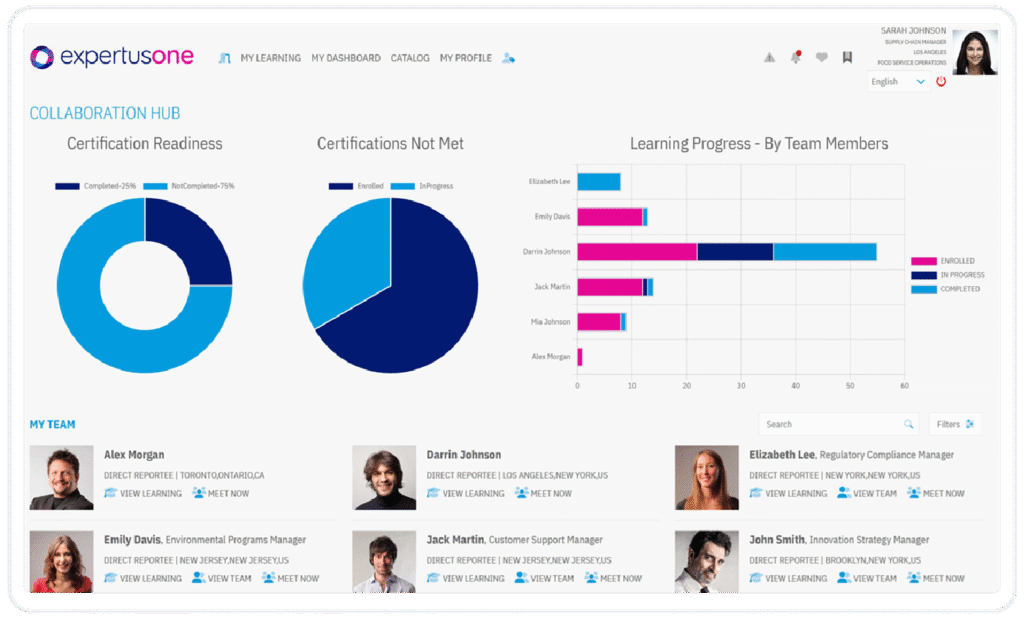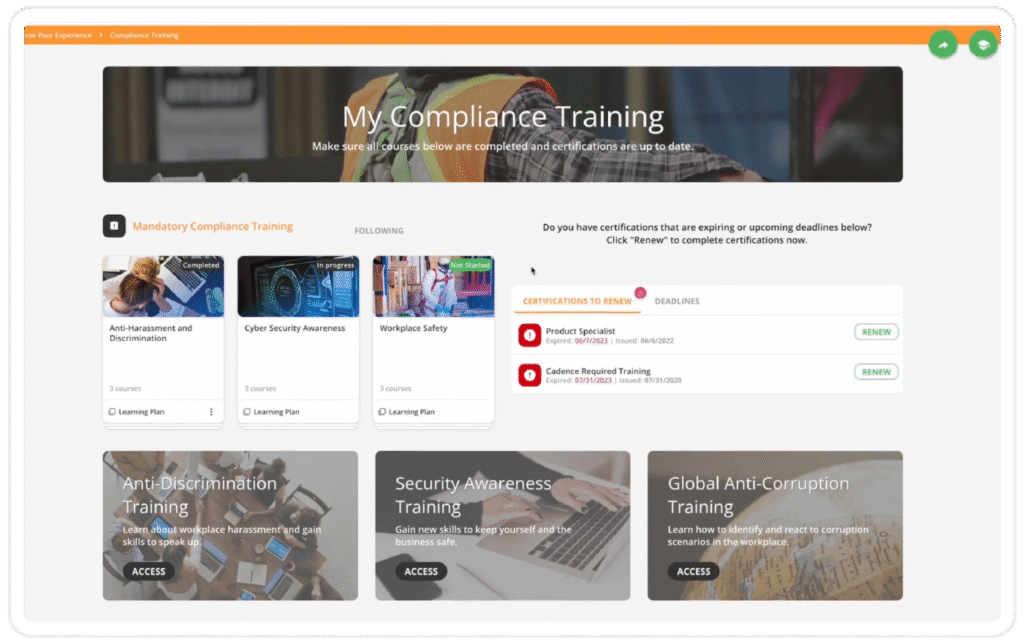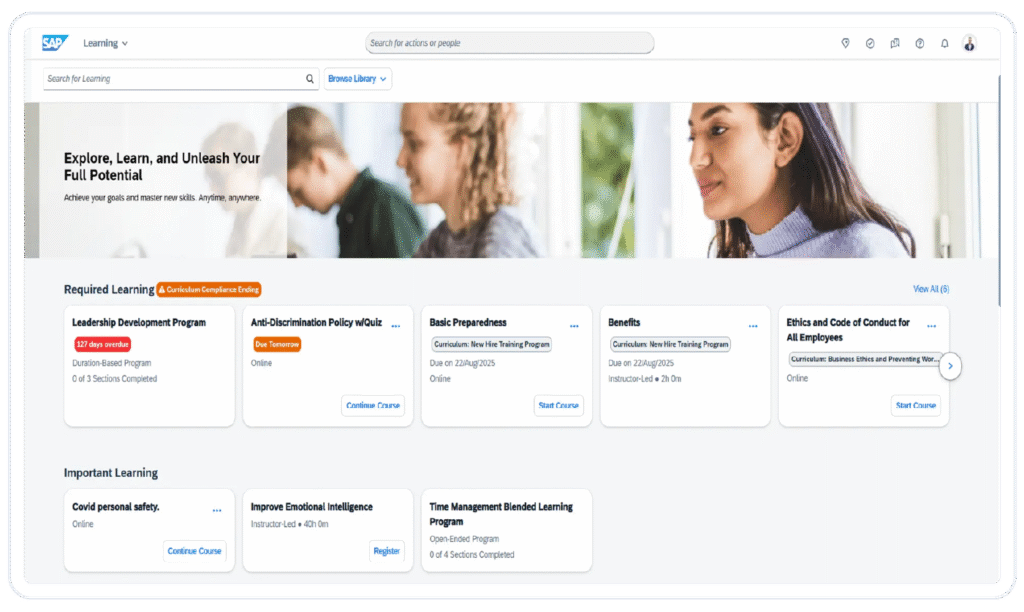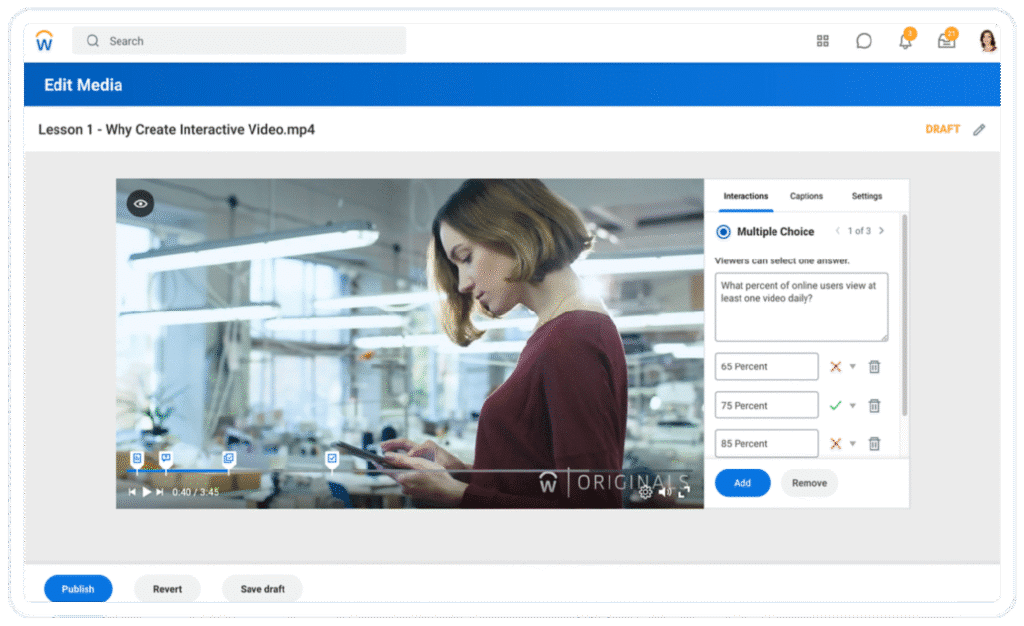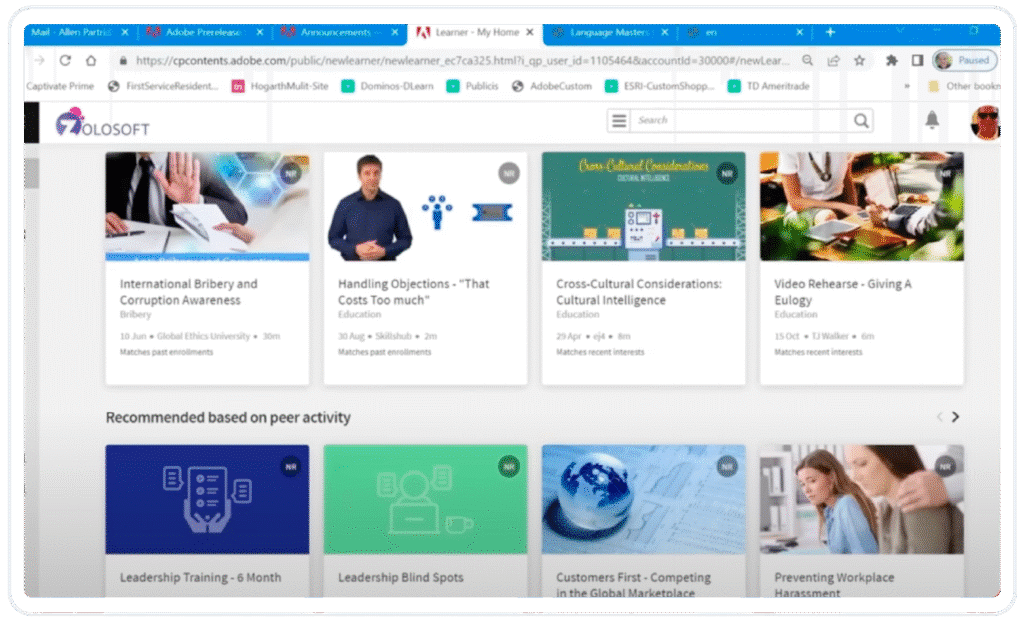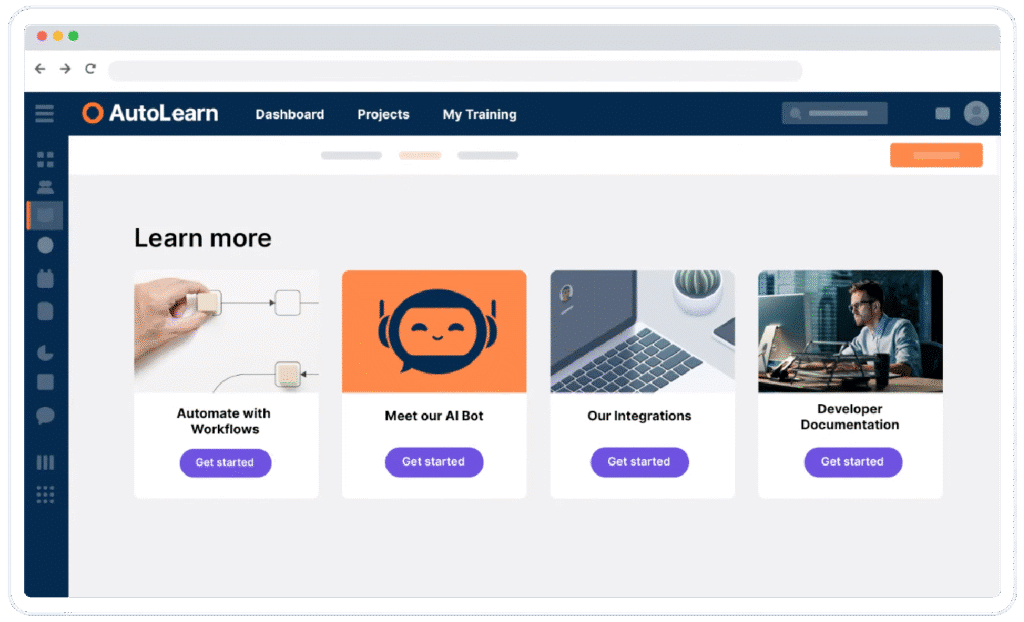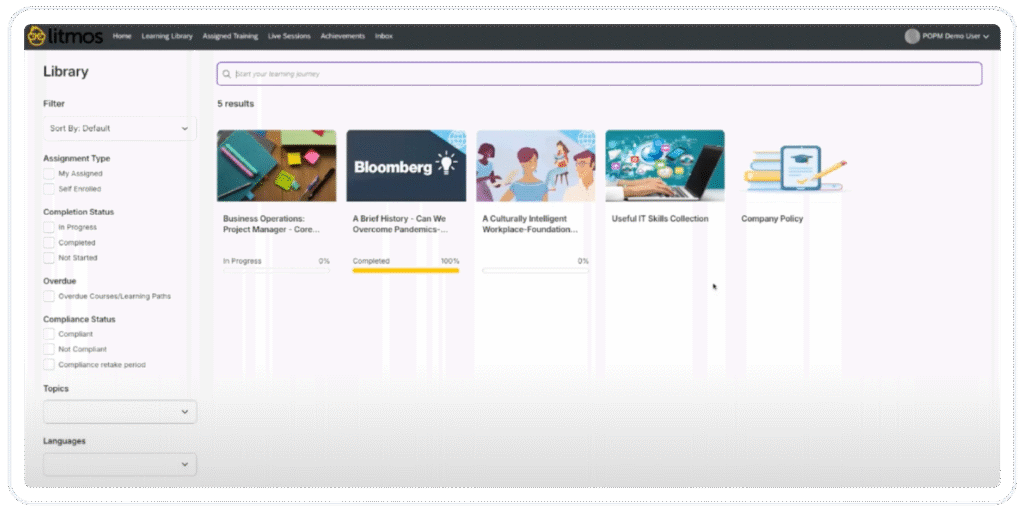10 Best Large Enterprise Learning Management Systems

Summary:
This guide offers a comprehensive comparison of the 10 best learning management systems (LMS) for large enterprises, detailing each platform’s strengths, weaknesses, and key features. It examines how leading solutions like Cornerstone, ExpertusONE, and Docebo support large-scale training through AI-driven personalization, automation, and integrations. It provides an in-depth look at which platforms deliver the best performance, scalability, and user experience.
The role of enterprise-class learning management systems in global corporations is critical to achieving a learning organization’s primary goals: improving learner education to drive enterprise-wide efficiencies and grow sales, while also delivering a headache-free administrative experience.
The evidence is clear: a great LMS can change the game for corporate learning.
Companies report that improved training efficiency gives them a 72% boost in competitiveness.
& +13% Performance: Analytics-driven LMS use leads to measurable gains in productivity and performance.
— driving the 80% LMS adoption rate among enterprises.
When it comes to training, the right tools can make or break your employees’ learning experience. In this guide, we’ll go through the key features and benefits of the 10 best enterprise learning management systems, starting with a quick review of what an LMS and LXP are—and why enterprises need both.
What is a Learning Management System (LMS) for Large Organizations?
A learning management system (LMS) is a software application for assigning and tracking courses, measuring employee compliance, and getting both a close-up and bird’s-eye view of a company’s overall training performance. It serves businesses large and small with training and development tools that allow you to offer specific courses, create learning objectives, and support overall training initiatives.
A LMS software is the right choice for your enterprise if you need help tracking and measuring compliance, supporting company-wide training initiatives, and providing enough personalization for the learner so they don’t have to figure out which courses to take. A LMS is especially beneficial for enterprises that have L&D teams or even learning managers (across departments) who need to create and assign training to keep their teams on track.
The best LMS should also have a strong focus on user experience. It should be natural and intuitive to use, so learners can focus only on the information being delivered and completing their training, rather than getting distracted by technical difficulties.
What is a Learning Experience Platform (LXP)?
A learning experience platform is an educational tool, like an LMS, but geared more toward the learner, enabling them to pick and choose from available courses more than they are assigned. You may also think of skills development platforms when you’re thinking of an LXP, as they fall under the same umbrella.
An LXP offers learners the freedom to find and even share courses that interest them, and they can collect learning materials from other resources and add them to the LXP, creating learning strategies of their own. It’s ideal for companies looking to use training as a way to engage their employees, but not necessarily monitor training success or focus on overall compliance goals.
Why Do You Need Both an LMS and LXP?
For many companies, crafting an engaging L&D experience requires both the administrative side that an LMS offers and the learner-driven experience that an LXP offers. (We have kept this in mind at ExpertusONE and created an enterprise LMS platform that combines the best of both worlds.)
But the reality is that learning platforms have advanced beyond this LMS vs. LXP dynamic. As learner needs have evolved, so have the technologies that are designed to serve them.
An integrated learning platform—that combines not only the features of an LMS and LXP, but a skills development platform too—fosters a learner-centric approach, making learning engaging, relevant, and enjoyable while enabling organizations to align their learning initiatives with strategic business objectives and talent development goals.
With innovative and engaging tools like an integrated content player, video conferencing, integration with apps like Slack, Salesforce, and Microsoft Teams, and elements like gamification and AI, an integrated learning platform offers learners an interactive training experience, just like an LXP. Even further, the learning experience can be personalized based on a learner’s interests (thanks to AI), and learners can choose from a wide selection of courses created within or outside of the platform.
Benefits of an Enterprise Learning Platform
Most large enterprises are stuck stitching together separate systems for compliance, upskilling, content discovery, and LXP functionality. This patchwork approach creates data silos, redundant administrative work, and a fractured learner journey. To provide the best possible experience for learners and administrators, an enterprise-grade integrated learning platform goes beyond the traditional approach and combines the functionalities of an LMS, LXP, and skills platform.
The convergence of these functionalities eliminates the need for multiple disjointed systems and streamlines the learning process, ensuring that learners can seamlessly transition from formal training to self-directed learning so they can assess, track, and apply acquired skills in real-world scenarios.
This combination enhances the learning experience through personalized content recommendations, social learning features, and user-driven content curation. The skills platform integration allows organizations to map skills to job roles, identify gaps, and design targeted learning pathways.
The platform fosters a learner-centric approach, making learning engaging, relevant, and enjoyable while enabling organizations to align their learning initiatives with strategic business objectives and talent development goals.
How is an Enterprise LMS Different From a Basic LMS?
Enterprise-grade LMSs are built with the scalability, customization, and advanced capabilities necessary to successfully manage and deliver large-scale training programs. Even better, these capabilities are available right out-of-the-box so organizations can immediately start to receive value from the investment.
On the other hand, a non-enterprise-grade or “basic” LMS generally provides just one solution for a single department or one solution for a single learning problem or challenge. It has limited flexibility to add new learning features or functionalities, and limited scalability to accommodate new learning groups or users. It’s the ideal solution if your learning needs are small, specific, and static.
Learn more about the differences in our guide, Enterprise Class vs. Basic LMSs.
10 Best Large Enterprise LMS To Consider (Quick Comparison)
| Vendor | Description | Ideal For |
|---|---|---|
ExpertusONE |
Cloud-based enterprise learning platform that unifies LMS, LXP, and skills into one. Offers modern UX, AI-powered curation, automation, branded portals, ecommerce, mobile-first features, and analytics to support distributed teams. | Enterprises with multiple audiences needing depth + ease of use at scale. |
Cornerstone Learn |
Unified suite for learning, performance, and compliance management with AI-driven skills and career pathing. Strong controls for regulated industries and supported by a broad global partner ecosystem. | Large organizations need to combine performance management with learning and compliance. |
Saba Learning Management |
Enterprise-grade LMS with robust workflows, certifications, and blended learning capabilities. Known for deep compliance features and strong classroom/curriculum management, now under the Cornerstone umbrella. | Large enterprises with heavy compliance/ILT environments. |
Docebo |
Modular learning suite with LMS, discovery, authoring, and skills engine. Offers multi-tenant architecture, flexible portals, AI features, and a wide integration catalog for embedding learning into third-party apps. | Mid-market L&D teams looking for extended enterprise capabilities. |
SAP SuccessFactors Learning |
LMS within SAP’s HCM suite, tightly integrated with SAP HR, user provisioning, and reporting. Offers extended enterprise training, ecommerce, and compliance capabilities. | Large enterprises are already using SAP. |
Workday Learning |
Embeds learning directly into daily work and career journeys. Provides analytics within Workday and supports skills-based talent strategies with seamless HR/talent integration. | Enterprises standardized on Workday products. |
Adobe Learning Manager |
Enterprise LMS with integrated LXP and skills features. Headless mode allows embedding into portals/apps, and strong content experiences help build branded external academies. | Design- and brand-driven organizations using Adobe Experience Cloud. |
Absorb LMS |
Cloud-based LMS with clean UX, extended enterprise options, and fast setup. Designed for approachable user experiences and quick time-to-value. | Small-to-medium businesses. |
LearnUpon LMS |
Multi-portal LMS focused on speed, simplicity, and automation. Helps lean teams manage multiple audiences with intuitive UX and strong onboarding support. | For mid-sized organizations with lean L&D teams serving extended enterprise learners. |
Litmos |
Mobile-first LMS emphasizing automation, compliance, and AI-assisted features. Offers separate tenants for external audiences and an extensive off-the-shelf content library. | Lean teams at mid-size companies that are focused on upskilling and fast external rollouts. |
Detailed Overview of the 10 Best Large Enterprise LMS
1. ExpertusONE
ExpertusONE is the cloud-based enterprise learning platform that delivers depth of learning functionality and best-in-class user experiences for learners and administrators. By combining the capabilities of an LMS, LXP, and skills platform, ExpertusONE boosts engagement, drives results, and streamlines training administration for large organizations and their increasingly distributed teams.
Its modern UX, AI-powered curation and discovery, and breadth of integrations and APIs make the learning experience more personalized without multiplying admin workload. Automation, branded learning portals, and ecommerce options help you run training as a growth engine for your whole business ecosystem, while native mobile functions and rich analytics keep experiences consistent and measurable at scale.
Ideal for: Enterprises that serve multiple audiences and require depth of functionality and ease of use at scale.
ExpertusONE Strengths:
- Combines LMS, LXP, and skills functionality into one platform
- Purpose-built for extended enterprise and multi-portal administration
- Native AI capabilities that adapt to every enterprise’s unique learning operations
- Strong automation to reduce admin effort across audiences
- Solid integrations and APIs for embedding learning in existing apps
- Mobile-first UX and analytics that surface who needs what next
- Fast deployment to get organizations up and running quickly
ExpertusONE Weaknesses:
- Startups and small organizations might not require the platform’s full capabilities
- Some change management might be needed if migrating from an HCM-bundled LMS
2. Cornerstone Learn
Cornerstone Galaxy unifies learning, performance, and compliance management into a single solution, with AI capabilities that enrich learner experiences and drive administrative productivity. It enables organizations to tie learning directly to skills, careers, and internal marketplaces.
Ideal for: Large organizations needing to combine performance management with learning and compliance administration.
Cornerstone Learn Strengths:
- LMS, LXP, and skills functionality within the platform
- Mature enterprise controls, compliance, and reporting for regulated industries
- AI-driven skills and career pathing capabilities
- Strong global services and partner ecosystem
Cornerstone Learn Weaknesses:
- Suite breadth can add complexity and result in longer deployments
- Slower innovation cycles
- Fragmented experience between LMS and EdCast (LXP acquisition)
Image Source: Cornerstone
3. Saba Learning Management
Saba Learning Management is an enterprise-grade learning and talent development platform with strong compliance, virtual and in-person training, and curriculum management depth. Now under the Cornerstone umbrella, it’s known for robust learning workflows and the ability to support formal and informal learning across global audiences.
Ideal for: Large enterprises with heavy compliance/ILT environments.
Saba Learning Management Strengths:
- Mature enterprise LMS with deep compliance and certification capabilities
- Backed by Cornerstone’s roadmap and ecosystem
- Strong blended learning, curricula, and classroom management
Saba Learning Management Weaknesses:
- UI/UX can feel older and clunkier compared with newer cloud-native solutions
- Lack of analytics depth
- Infrequent platform updates

Image Source: Saba Cloud Learning
4. Docebo
Docebo offers a modular learning suite spanning LMS, LXP-style discovery, authoring tools, and a native skills engine. It has multi-tenant architecture and flexible portals, and a rich integration catalog to blend learning into third-party apps.
Ideal for: Mid-market L&D teams looking for extended enterprise capabilities.
Docebo Strengths:
- Fully customizable platform with white labeling
- AI functionality that includes content creation, recommendations, and user management
- Strong social learning capabilities
Docebo Weaknesses:
- Out-of-the-box version is limited in functionality
- Instructor-Led Training (ILT) features could use more polish
- Limited enterprise scalability
Image Source: Docebo
5. SAP SuccessFactors Learning
SuccessFactors Learning is the LMS within SAP’s HCM suite, leading to strong integrations with SAP HR, user provisioning, and reporting. For organizations already invested in SAP, it centralizes learning while offering options to serve external audiences through extended enterprise capabilities and ecommerce.
Ideal for: Large enterprises already using other SAP products.
SAP SuccessFactors Learning Strengths:
- Enterprise-grade compliance, audit, and security
- Tight integration with SAP HCM solutions
- Large SAP partner network
SAP SuccessFactors Learning Weaknesses:
- Clunky UX/UI that isn’t learner-centric
- LXP/skills often rely on adjacent SAP services or partners
- Advanced analytics requires add-ons or BI integration
- Innovation velocity tied to broader SAP release cycles
Image Source: SAP
6. Workday Learning
Workday Learning embeds personalized learning experiences directly within learners’ daily tasks and career journeys. For Workday-centric organizations, the seamless connection reduces friction for admins and learners alike.
Ideal for: Enterprises standardized on other Workday products
Workday Learning Strengths:
- Learning in the flow of work
- Provides a strong foundation for skills-based talent strategies
- Solid analytics within Workday reporting
Workday Learning Weaknesses:
- Complex UX/UI and navigation
- LXP/skills rely on adjacent Workday solutions or partners
- Typically higher TCO if you’re not already a Workday shop
Image Source: Workday
7. Adobe Learning Manager
Adobe Learning Manager (formerly Adobe Captivate Prime) is an enterprise LMS with integrated LXP and skills capabilities and a headless mode to embed learning in portals, apps, and websites. For companies running Adobe Experience Cloud, it unlocks branded external academies and powerful content experiences.
Ideal for: Design- and brand-driven teams already using Adobe Experience Cloud.
Adobe Learning Manager Strengths:
- Built-in LXP capabilities that adapt to individual needs
- Strong blended learning/certification support
Adobe Learning Manager Weaknesses:
- Full capabilities rely on connecting with other Adobe tools
- Doesn’t have an authoring tool to build assessments directly
Image Source: Adobe
8. Absorb LMS
Absorb’s cloud-based LMS has a clean UX, fast time-to-value, and extended enterprise features for powering customer and partner academies. Skills management is available via Absorb Skills, while LXP-like experiences are available via Absorb Engage.
Absorb LMS Strengths:
- Very approachable UX
- Simple setup gets customers up and running fast
Absorb LMS Weaknesses:
- Limited depth of functionality for complex enterprise needs
- Lack of analytics depth
- No native administrative bulk uploading capabilities
Image Source: Absorb
9. LearnUpon LMS
LearnUpon LMS focuses on speed, simplicity, and multi-audience delivery. Its multi-portal architecture, automation, and easy course management features help lean teams target the right content to each audience with minimal admin effort.
Ideal for: Lean L&D teams serving extended enterprise learners.
LearnUpon Strengths:
- Multi-portal and extended enterprise training
- Fast deployment and intuitive UX
- Strong onboarding and support
LearnUpon Weaknesses:
- Limited depth of functionality for complex enterprise needs
- Branding options are minimal and very basic
- Lack of analytics and reporting depth
Image Source: LearnUpon
10. Litmos
Litmos provides separate tenants/instances for external audiences and emphasizes automation, mobile UX, and a growing set of AI-assisted features. It ensures compliance with expert-vetted courses on safety, privacy, ethics, and more.
Ideal for: Lean teams focused on upskilling and fast external training rollouts.
LearnUpon Strengths:
- User-friendly UX/UI for learners
- Extensive off-the-shelf content library and partner ecosystem
- Strong customer support
LearnUpon Weaknesses:
- Clunky reporting engine
- Customisation of the look and feel is not easy
Image Source: Litmos
Key Features of an Enterprise Learning Platform
Integrated learning platforms built for a complex enterprise offer personalization, insightful data reports, and flexibility so that learners and managers can interact with training materials whether at home, in the office, online, or offline. Here are a few key features of these platforms:
One Platform, Multiple Learning Audiences: A single platform that combines the best of LMS and LXP empowers organizations to create highly customized and specialized learning pathways for internal and external learning groups across multiple use cases.
Configurable Hubs: The platform should offer configurable hubs that streamline the user experience. Hubs can be created for compliance, product training, sales enablement, and employee development initiatives. The features within each hub can be specially selected to serve that audience, improve efficiencies, and make training more relevant, personalized, and effective.
Extensible Architecture: Through integration with third-party applications, like Salesforce, Slack, and Microsoft Teams, the platform ensures that learning becomes ingrained in an employee’s daily work routines. It promotes continuous learning and empowers professionals to enhance their product knowledge and techniques without leaving the platform they use most frequently, and enables learners to receive training updates, share knowledge, and access learning content directly within their Slack or Teams workspace.
Personalized Content: By analyzing data on learner behavior, preferences, and skill gaps, the platform offers AI-driven content recommendations that align with each individual’s unique learning needs. By leveraging AI, ExpertusONE empowers learners to take control of their learning experiences while organizations benefit from enhanced learner engagement, improved knowledge retention, and, ultimately, a more skilled and productive workforce.
AI Native Capabilities: The platform is built for AI, allowing for the seamless movement and use of the data needed for your team to get the most out of AI innovations. It includes Generative AI for rapid content generation, intelligent coaching, and real-time support to scale learning. Personalized learning pathways generated by AI help every learner get the training they need at the right moment and in the right place. Users can also leverage natural language capabilities so they can ask for the information and data they need in plain language, like, “Which departments completed the most training this month?”
How to Select an Enterprise LMS Vendor
The right enterprise LMS vendor doesn’t just provide technology—they help ensure your organization can scale training programs, engage learners, and drive measurable business outcomes. But with hundreds of LMS providers on the market, selecting the right one for an enterprise can feel overwhelming. The stakes are high: pick the wrong vendor, and you may face low adoption rates, frustrated administrators, or costly migrations later.
Here are some key questions to ask vendors to determine which is right for you:
1. How does your system handle multiple audiences and complex organizational structures?
Enterprise training rarely means a one-size-fits-all approach. You may need to serve employees, contractors, partners, or franchisees—each with unique permissions, branding, and content needs. Ask how the platform manages multiple audiences and provides engaging experiences for all of them without creating an administrative burden.
2. What reporting and analytics capabilities are built in?
Executives will want to see the training’s impact on performance, retention, and compliance. Request demonstrations of dashboards and reports, focusing on whether they’re easy to customize and share with stakeholders.
3. How does the LMS integrate with our existing systems?
Confirm whether the vendor offers pre-built connectors or requires custom development to connect an HRIS, CRM, and collaboration tools. A strong integration strategy reduces manual work and ensures a smoother user experience, wherein learners can dive into the training within their daily flow of work.
4. How flexible is your platform when it comes to configuration and administration?
An enterprise LMS should do more than deliver training—it should simplify how administrators configure, manage, and govern the learning environment at scale. A strong platform should allow you to tailor permissions, notifications, and branding to fit your organization’s structure while ensuring scalability, security, and data protection.
5. What’s your approach to implementation and support?
Ask about the vendor’s onboarding process, training resources, and ongoing support. Will you get a dedicated customer success manager? How quickly are support tickets resolved? Strong customer support, especially if you require deep customization, often separates successful deployments from failed ones.
6. How do you support continuous innovation?
Learning technology evolves quickly. Explore how frequently the vendor releases updates, whether they align with customer feedback, and if upgrades might disrupt your workflows. You don’t want a system that feels outdated after only a year or two. This conversation should also include a roadmap for their AI functionality and how seamlessly innovations in this space can be added to the platform.
Eliminate Learning Boundaries
When evaluating learning platforms for large enterprises, keep in mind how bringing together the strengths of an LMS, LXP, and skills development platform can deliver value to both learners and administrators. Whether it’s a quick update to a compliance module or the integration of the latest learning analytics tools, enterprise integrated learning platforms can drive strategic gains, improved learner effectiveness, and stronger platform adoption.
With an integrated platform, learning leaders can move beyond chasing administrative tasks and instead focus on driving strategy, experimenting with new approaches, and adapting quickly to whatever comes next—be it new regulations, shifts in industry needs, or evolving learner expectations.
FAQs
An enterprise LMS is built for scale. It supports multiple business units, audiences, and global locations with advanced automation, analytics, and customization—features that go far beyond what standard LMSs provide.
An LMS manages compliance, structure, and administration, while an LXP empowers learners with discovery and personalization. Together, they create a complete learning ecosystem that drives engagement and measurable outcomes.
AI enables personalized learning recommendations, automates content curation, and simplifies administrative tasks. It helps large organizations scale learning efficiently while improving learner engagement and knowledge retention.
Key Takeaways
Integrated learning platforms that unify LMS, LXP, and skills capabilities provide the best experience for both learners and administrators.
AI-powered personalization and automation are now essential for large organizations managing complex training needs..
Scalability and flexibility separate true enterprise-grade systems from basic LMSs.
Strong analytics and reporting help link training performance to measurable business impact..
ExpertusONE leads the pack with a unified platform built for multi-audience learning, modern UX, and AI-driven insights. Cornerstone, Saba, and Docebo are not far behind.

